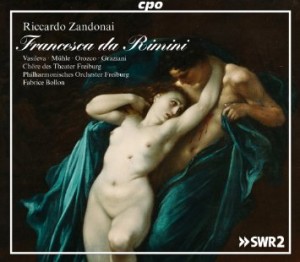Zandonai’s Francesca da Rimini is a hothouse flower of an opera. The plot is taken from Dante’s Inferno (by way of Gabriele D’Annunzio’s disreputable 1901 play) and concerns the forbidden love affair between Francesca and Paolo: she is betrothed to his deformed brother Gianciotto but falls in love with the devastatingly handsome Paolo instead, when he is sent in Gianciotto’s place to fool Francesca into accepting the proposal. (There’s a third brother, Malatestino, who loses an eye in the second-act battle. He loves Francesca too.)
In Hell, Dante has Francesca and Paolo swirling around, close to one another, never able to touch. You can’t say that’s not a cool punishment for disloyalty, and the sensual yearning of the experience is all over Zandonai’s music. Gianciotto, by the way, stabs the lovers in the opera’s final moments and they die—a pity, really, since what they were singing was so beautiful.
The opera, an interesting combination of the true verismo style and a perfumed, Pre-Raphaelite ornamentation and texture, has remained on the fringes of the repertoire. There have been no seriously good recordings available: an old “live” set starring the great Magda Olivero and the leather-lunged Mario del Monaco is in terrible sound as is one with the amazing Leyla Gencer and a third with Raina Kabaivanska; a DVD with Renata Scotto and Placido Domingo is worth your time and money, another DVD with Daniela Dessi and Fabio Armiliato is not. (A set of highlights accompanied the Decca complete recording of Giordano’s Fedora, again with the brilliantly loud and passionate Olivero and del Monaco, but it is no longer available.) I run through these because this present one has them all beat, and without a well-known “star singer” in the cast.
This is the only one of Zandonai’s 13 operas to have a place in opera lover’s hearts, and even it is a guilty pleasure. Its humid atmosphere is broken by scenes of battle that go on far too long and are genuinely ugly, but—and this is the real but—the three love duets for our soprano and tenor are as beautiful as anything composed by Zandonai’s contemporaries, Mascagni, Giordano, Leoncavallo, and yes, Puccini. And if his tunes are not as easily hummable as the others mentioned, his unbridled passion will certainly keep your nerves a-tingling.
But all of that picking apart aside, conductor Fabrice Bollon and his Freiburg Orchestra and Chorus make a remarkable case for the entire work. The sweet, late-Romantic music is played with lush portamento and attention to the score’s delicacies, and the huge moments—the warring, the jealous, hate-filled confrontations between the brothers—are gorgeous and brutal by turns. The opera also contains lovely moments for Francesca and her ladies and some handsome orchestral interludes. It is easy to get lost under its spell, even while being outraged by some of the violent sensationalism.
Bulgarian-born soprano Christina Vasileva may not have an instantly recognizable sound, but the voice and technique are rock solid and she’s devoid of bad habits. The spinto quality is appealing, and most importantly she sings off the text and with a variety of color and shadings that bring the clearly alluring Francesca to life. As her lover, Paolo, Martin Mühle’s potent tenor is untiring and always on the note, and he’s solidly dramatic and involved. They both sing with just the right hysterical urgency. Juan Orozco snarls jealously and insanely as Gianciotto, and Adriano Graziani manages to sound spiteful as the hateful Malatestino. The ladies are lovely.
This is a major release and fills a gap in the recorded repertoire with style and fizz. And if it misses that berserk, desperate quality that Olivero and del Monaco give it, well, you can’t have everything. Highly recommended!
































